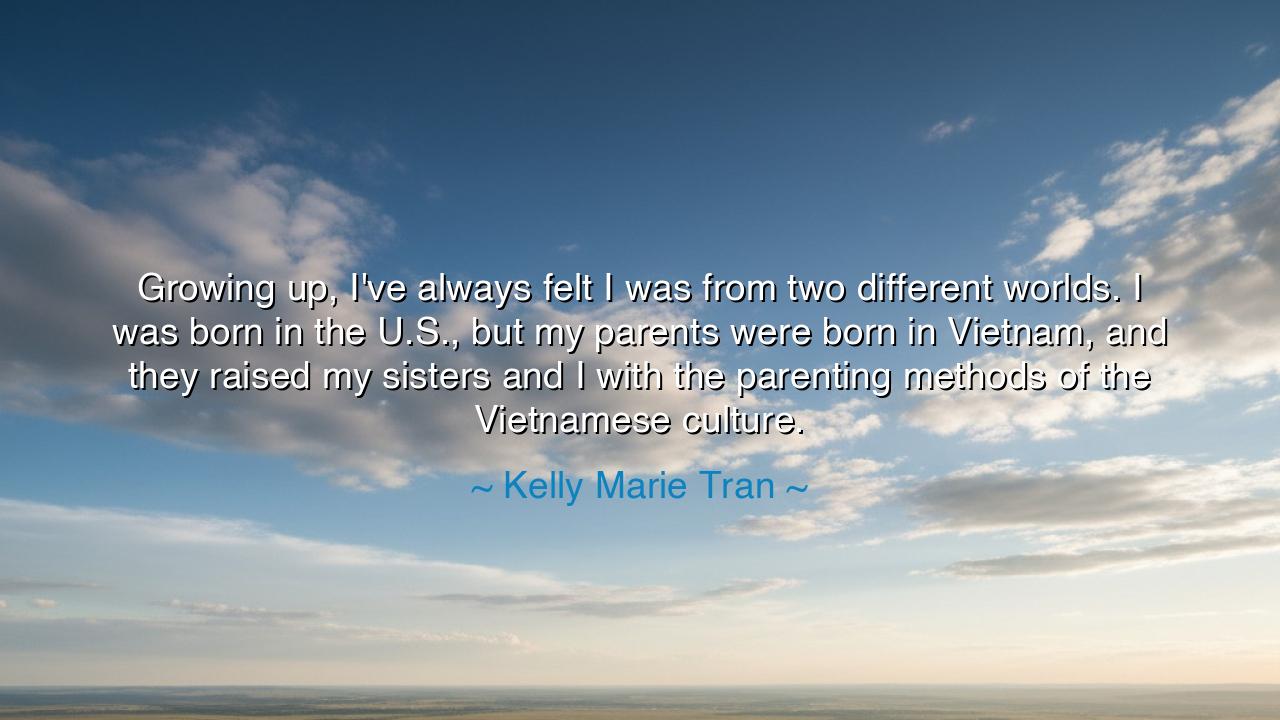
Growing up, I've always felt I was from two different worlds. I
Growing up, I've always felt I was from two different worlds. I was born in the U.S., but my parents were born in Vietnam, and they raised my sisters and I with the parenting methods of the Vietnamese culture.






When Kelly Marie Tran declared: “Growing up, I’ve always felt I was from two different worlds. I was born in the U.S., but my parents were born in Vietnam, and they raised my sisters and I with the parenting methods of the Vietnamese culture,” she gave voice to the eternal experience of the children of migration — those who walk with one foot in the land of their birth and the other in the land of their ancestors. Her words reveal the deep tension and beauty of dual identity, where two traditions meet, sometimes clashing, sometimes blending, but always shaping the soul of the child.
The origin of this truth lies in the history of families who cross seas and borders, carrying their customs like sacred fire, determined not to let them die on foreign soil. For Tran’s parents, born in Vietnam, their parenting methods were formed by their homeland’s values — discipline, respect for elders, sacrifice for family, humility before community. Yet their daughter was born in the United States, where independence, self-expression, and individual choice were celebrated as guiding stars. Thus, from her earliest years, Tran felt the pull of two worlds: one calling her toward duty, the other toward freedom.
Such stories are not new. Consider the tale of Marcus Aurelius Antoninus, known as Caracalla, who lived as a Roman emperor but was also steeped in the influences of his Syrian mother’s heritage. His identity was shaped by cultures colliding within him. Or think of children of the Jewish diaspora, raised in Babylon or Alexandria, who honored the laws of their ancestors while learning the ways of foreign lands. Each generation of those between worlds has carried the same question Tran speaks of: Who am I, when two worlds claim me?
Her words also show the power of parenting across cultures. Parents who raise their children in foreign lands often cling more tightly to tradition, fearing it may be lost. This makes the home a vessel of the old world, even while the child steps outside into the new. For the child, this can feel like being torn between two truths — yet, over time, it can also become a gift. The child learns resilience, adaptability, and the ability to see the world through more than one lens. Tran’s confession of “two different worlds” is not only a burden but also a source of strength.
The emotional weight of this dual upbringing is profound. A child raised in this way may feel alien in both places: not fully of their parents’ land, not fully of the land of their birth. Yet this very in-betweenness holds power. It creates empathy, the ability to bridge divides, the capacity to understand struggle from many sides. Tran, like countless others, transformed this tension into her art, carrying both worlds into her performances and public voice. Thus, her story shows how difference, once embraced, becomes strength.
The lesson for us is clear: to be of two worlds is not to be broken, but to be broadened. Parents, when raising children in a land far from your own, know that your traditions are not chains but gifts — provided you give them with love, not fear. And children of such homes, remember that your dual heritage is not a curse but a crown, for you carry within you two lineages, two wisdoms, two ways of seeing life. Identity is not subtraction, but addition.
Practical actions must follow: honor the traditions of your family, even if you live in a different land. Ask your parents why they do things as they do, and seek to understand their sacrifices. At the same time, do not fear to claim the values of the culture in which you were born, for you, too, belong there. Create rituals that blend the old and the new — meals, celebrations, ways of speaking — so your heritage is not divided but united.
So let Kelly Marie Tran’s words be remembered as a testament to all who dwell between cultures: to live between worlds is to live with depth. The challenge is great, for it requires balance, patience, and the courage to define oneself anew. But the reward is greater still: to be not half of each world, but fully of both, carrying within you the wisdom of the ancestors and the vision of the future.






AAdministratorAdministrator
Welcome, honored guests. Please leave a comment, we will respond soon